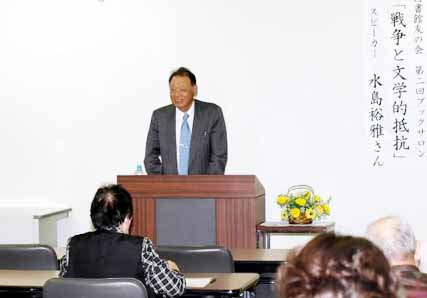Hiroshima University professor gives lecture on “War and Literature” in South Korea
Nov. 30, 2008
by Kazunobu Ito, Staff Writer
At the invitation of the Modern Japanese Literature Society of South Korea, Hiromasa Mizushima, 66, professor emeritus of Hiroshima University, delivered a lecture on the theme of “War and Literature” in South Korea in late October. Mr. Mizushima presented a summary of his lecture given at Chung-Ang University, as well as responses from the audience who attended his talk, at the “book salon,” a meeting for supporters of the Hiroshima Prefectural Library, in downtown Hiroshima on November 15.
Mr. Mizushima explained that his lecture focused on Tatsuo Hori, Tamiki Hara, and Sadako Kurihara as representative Japanese writers of the pre-war, wartime, and post-war periods, respectively. Since the entry of Japanese culture into South Korea had been restricted for many years, the study of modern Japanese literature only matured as a discipline in the 1990s. Because of this, he said, many who attended his lecture were learning about the work of Tamiki Hara and other writers for the first time.
At the lecture, Mr. Mizushima also recited such poems as “We Shall Bring Forth New Life” and “When We Say ‘Hiroshima’” by Sadako Kurihara. “In South Korea,” he remarked, “atomic bombs have been thought of as ‘good bombs’ that liberated the country. Before I spoke about the atomic bombing of Hiroshima, I was concerned about the sort of response I might receive from the participants.”
Mr. Mizushima continued, “I assume scholars and students in South Korea had believed that Japan invariably asserts that the Japanese people were victims. But it seems they were surprised to learn, through the works of Hara and Kurihara, that Japanese writers have reflected more broadly on humanity and the world. I was moved to see that the young people in attendance were touched by these poignant Japanese poems.”
At the meeting at the library, titled “War and Literary Resistance,” Mr. Mizushima also commented on Tatsuo Hori, a writer who was active in the 1930s and 1940s. Hori, who was born in 1904 and died in 1953, is said to have taken no stance in regard to war and published only works unrelated to war.
Mr. Mizushima, however, pointed out that some parts of “Wooden Cross,” published in 1940, can be interpreted as critical of Germany’s invasion of Poland, which triggered World War II. “We can see a strong spirit of resistance in the spine of Hori’s works,” Mr. Mizushima said.
“Literature may not directly impact war,” Mr. Mizushima said. “But,” he added, referencing the mission statement of the Western Japan Culture Confederation, which Sadako Kurihara and her husband championed after the war, “strengthening culture is critical to prevent war from occurring. And Hiroshima, in particular, shoulders such a responsibility.”
(Originally published on November 23, 2008)
At the invitation of the Modern Japanese Literature Society of South Korea, Hiromasa Mizushima, 66, professor emeritus of Hiroshima University, delivered a lecture on the theme of “War and Literature” in South Korea in late October. Mr. Mizushima presented a summary of his lecture given at Chung-Ang University, as well as responses from the audience who attended his talk, at the “book salon,” a meeting for supporters of the Hiroshima Prefectural Library, in downtown Hiroshima on November 15.
Mr. Mizushima explained that his lecture focused on Tatsuo Hori, Tamiki Hara, and Sadako Kurihara as representative Japanese writers of the pre-war, wartime, and post-war periods, respectively. Since the entry of Japanese culture into South Korea had been restricted for many years, the study of modern Japanese literature only matured as a discipline in the 1990s. Because of this, he said, many who attended his lecture were learning about the work of Tamiki Hara and other writers for the first time.
At the lecture, Mr. Mizushima also recited such poems as “We Shall Bring Forth New Life” and “When We Say ‘Hiroshima’” by Sadako Kurihara. “In South Korea,” he remarked, “atomic bombs have been thought of as ‘good bombs’ that liberated the country. Before I spoke about the atomic bombing of Hiroshima, I was concerned about the sort of response I might receive from the participants.”
Mr. Mizushima continued, “I assume scholars and students in South Korea had believed that Japan invariably asserts that the Japanese people were victims. But it seems they were surprised to learn, through the works of Hara and Kurihara, that Japanese writers have reflected more broadly on humanity and the world. I was moved to see that the young people in attendance were touched by these poignant Japanese poems.”
At the meeting at the library, titled “War and Literary Resistance,” Mr. Mizushima also commented on Tatsuo Hori, a writer who was active in the 1930s and 1940s. Hori, who was born in 1904 and died in 1953, is said to have taken no stance in regard to war and published only works unrelated to war.
Mr. Mizushima, however, pointed out that some parts of “Wooden Cross,” published in 1940, can be interpreted as critical of Germany’s invasion of Poland, which triggered World War II. “We can see a strong spirit of resistance in the spine of Hori’s works,” Mr. Mizushima said.
“Literature may not directly impact war,” Mr. Mizushima said. “But,” he added, referencing the mission statement of the Western Japan Culture Confederation, which Sadako Kurihara and her husband championed after the war, “strengthening culture is critical to prevent war from occurring. And Hiroshima, in particular, shoulders such a responsibility.”
(Originally published on November 23, 2008)








